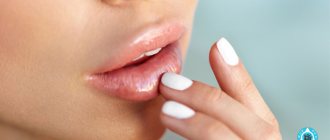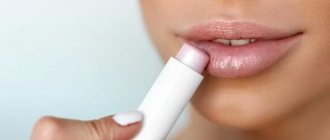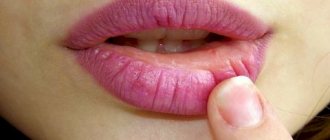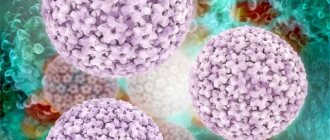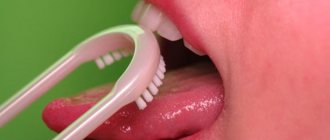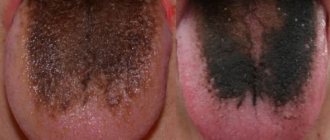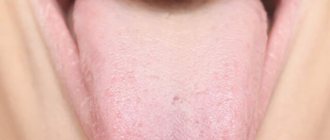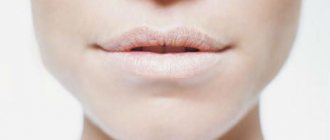Why do lips dry out?
Dry lips occur due to several factors, such as:
- dry or windy weather;
- frequent stress;
- habit of licking lips;
- taking medications that affect the functioning of the salivary glands and muscles around the mouth;
- increased body temperature during illness;
- intoxication processes;
- allergic reaction to cosmetics;
- diabetes;
- kidney diseases;
- bad habits.
Lips often become dry in people who are on diets or follow a vegetarian diet. In such cases, the condition of the lips worsens due to a deficiency of fat-soluble vitamins, which are found in foods of animal origin.
Cheilitis in children
Depending on the age of the child, he may experience a certain type of cheilitis.
Newborns suffer from a catarrhal disease caused by the prolonged presence of a pacifier or bottle in the mouth. Plus, saliva accumulates on the nipples of the lips, irritating sensitive baby skin.
If the disease is ignored, hoping that it will go away on its own, cheilitis will develop into an exfoliative form, accompanied by the formation of scales, which the child will not be able to remove himself (parents are highly discouraged from interfering in this process, since attempts to tear off the crusts can cause cracks, which will only aggravate the situation ).
Constant sucking of the mother's breast is an equally common cause of the development of the disease: during feeding, cracks form on the nipples, into which bacteria penetrate, which causes cheilitis.
What should beautiful and healthy lips look like?
Beautiful and healthy lips are characterized by the following signs:
- evenness and smoothness of the skin;
- symmetry of the corners of the mouth;
- the presence of a pink or red tint to the lips;
- absence of peeling, cracks and purse-string wrinkles;
- convex volume of the labial border;
- absence of jams, pigmentation and pathological manifestations.
It is also important to pay attention to the presence of a hollow above the upper lip and a cupid's arch, which should be clearly defined.
How to treat lips with cheilitis
The most important thing in treating cheilitis is to identify its cause, which is difficult to do without professional help. You'll have to contact a specialist. First, it is better to go to a therapist, and he will then refer you to a specialist doctor.
Typically, treatment for diseases of the lips and skin around the mouth is based on eliminating not the symptoms, but the root cause. It includes lifestyle changes, proper nutrition, and medication.
If the cause of inflammation is an infectious or fungal infection, local drugs are included in the therapy. Typically, patients are prescribed various medicinal ointments for external use, which must be applied to damaged skin several times a day:
- anti-inflammatory – Tetracycline, Erythromycin;
- antifungal – Clotrimazole;
- hormonal – Prednisolone.
To cure lips, you need to influence them not only from the outside, but also from the inside. The skin around the mouth often suffers from a lack of B vitamins, so they are often prescribed in the treatment of lips.
Top 10 tips on how to care for your lips
To keep your lips smooth and hydrated, follow these tips:
- Regularly exfoliate the skin of your lips with special scrubs or a damp, thick towel.
- Moisturize and nourish your lips with herbal balms; in the summer, you should additionally use products with SPF filters.
- Maintain a drinking regime of drinking 2 liters of clean water per day.
- Include in your diet foods high in omega-3 fatty acids (nuts, vegetable oils, vegetables and herbs, fatty fish).
- Stop smoking, as tobacco smoke dries out the thinnest skin of the lips and leads to the formation of purse-string wrinkles.
- Wash off makeup not with soap, but with two-phase makeup removers. In addition, while washing your face, it is good to do simple exercises to strengthen the orbicularis oris muscle. It is necessary to tightly compress and unclench your lips, and also pronounce the letters A, O, U, Y.
- Take complexes containing vitamins A, C, E and group B.
- Apply only high-quality cosmetics to your lips that do not contain camphor, phenol, aniline dyes and heavy metal salts.
- It is recommended to add lip masks to winter care, or replace them by applying a restorative cream at night.
- It is important to remember that cosmetic procedures play a huge role in maintaining external beauty. Therefore, do not forget about professional salon care for thin and delicate lip skin.
Why do lips crack and peel, and what can you do about it? Expert advice
We asked dermatologists what to do if your lips peel and crack, and how to properly care for them if the balm does not help.
Experts:
- Olga Fem is a cosmetologist-esthetician with a medical education, the founder of the website kosmetologa.net.
- Alexander Prokofiev is a dermatovenerologist, medical expert of the La Roche-Posay brand.
- Svetlana Kovaleva is a dermatologist and cosmetologist.
- Evgenia Reshetnikova is a dermatovenerologist, cosmetologist, and head of the medical department at Sesderma.
What causes lips to become dry and flaky?
Most often due to improper care. For example, lack of protection when it is needed.
The fact is that lips are deprived of natural defense mechanisms. This zone is a transition zone between the skin of the face and the oral mucosa, so the skin here has an atypical structure. It is thinner (three layers, not five, no shiny or grainy). The upper stratum corneum is also very thin, and complete keratinization does not occur in it (which is why the lips are soft). The skin of the lips does not contain melanin and is not able to reflect the effects of sunlight. It has a reduced ability to accumulate and retain water. Moisture evaporates much faster than from other areas of the face, and this leads to dryness, flaking, and the risk of inflammation.
Okay, this is in general, but more specifically, why do peeling appear?
There are external and internal reasons. External:
1. You do not use balm before going outside in cold weather (frost, wind). It creates an occlusive film on the surface of the lips, which prevents moisture evaporation and serves as a protective barrier.
2. You do not use a balm with SPF during periods of increased solar activity.
“Because the skin of the lips does not contain melanin, it cannot tan, but it can get burned. A burning sensation and dryness appear,” explains Evgenia Reshetnikova. “ An ordinary balm, without a sun protection factor, does not work here. On the contrary, you risk increasing the skin's sensitivity to ultraviolet radiation : the balm, like a lens, will increase exposure to rays.
It is advisable to use a balm with SPF in winter, especially if you are into mountain sports: snow reflects the sun's rays. Apply the product before going out into the sun and reapply every 1.5-2 hours.”
3. Dry air at home and in the office . It is known that hot dry air (from batteries, heaters) dries out the skin. But cold (from the air conditioner), according to experts, is no better.
“It is advisable to maintain humidity at 40-60%,” advises Olga Fem. “Unfortunately, 30% in an apartment in winter is a common occurrence. Buy a humidifier if possible."
4. You lick or bite your lips when you're nervous. Try to keep an eye on this.
5. You breathe through your mouth , and this quickly dehydrates your skin. We need to fight the cause of nasal congestion.
6. You regularly go to a dry (Finnish) sauna, a swimming pool with chlorinated water, and often swim in the sea . The same advice - use balm.
7. Frequent and unnecessary use of lip balm.
Olga Fem: “ Balm and hygienic lipstick are not products for regular care, but for temporary protection. With constant use, they worsen the condition of the lips. Why is that? A barrier film on the surface of the skin prevents moisture evaporation. In certain situations this is useful - for example, in the cold. But, in general, evaporation is a natural physiological process. If the balm is constantly on the lips, the cells do not receive a signal that the natural barrier needs to be repaired - after all, there is an artificial one on the lips. Over time, this leads to the fact that you cannot do without chapstick at all. It’s similar to the situation with smoking: another cigarette quickly relieves discomfort, but it also maintains addiction. How to break the vicious circle? Stop using balms and hygienic lipsticks for no reason.”
“Balm is a means for temporary protection, and not for regular care,” - Olga Fem
8. You unknowingly apply facial care to your lips . If it's a regular moisturizer, no problem. But acne treatment products (especially those with retinol and its derivatives) can cause dryness and flaking when they come into contact with the skin of the lips.
9. When brushing your teeth, the paste gets on the skin of your lips. Menthol and eucalyptus essential oil, even with minute contact with lips, provoke dryness.
View this post on Instagram
Posted by Andrea (@girlgreybeauty)
In addition, there are internal causes of dry and flaky lips:
- Dehydration of the body . “It can occur if a person drinks a lot of coffee and little clean water or abuses alcohol,” says Olga Fem.
- Chronic stress.
- Frequently recurrent episodes of herpes infection.
- Gut microbiome disruption.
- Allergic reaction to cosmetics, food, medicines.
- Excess or deficiency of vitamins and minerals.
- Drug therapy. In particular, such side effects sometimes occur when taking Roaccutane.
- Skin diseases - dryness can be a sign of exacerbation of atopic dermatitis, eczema, neurodermatitis, psoriasis.
- Cheilitis is a general term for inflammatory processes of the skin of the lips of various types. They occur against the background of individual hypersensitivity to UV rays or frost, hyperfunction of the salivary glands, immunoallergic changes, anxiety and depressive disorders and other factors.
- Other chronic and infectious diseases. We won’t list them so as not to scare you, but many pathologies are accompanied by dry lips.
How can you understand that your lips are peeling, for example, due to dry air, and not some kind of disease?
“If the peeling is not very strong, most likely it is caused by bad weather, dry air or the habit of licking your lips,” says Alexander Prokofiev, “But if redness, thickening, burning, disturbance of the skin texture, cracks appear, you need to consult a dermatologist.”
If the problem is episodic or seasonal - for example, it arose with the onset of cold weather, during a vacation at the seaside, or you started going to the pool or using matte lipstick more often than usual - you also don’t have to worry.
“After eliminating the cause or adjusting the care, this dryness will go away on its own,” says Olga Fem. “If you don’t notice any changes after a month, it’s better to go to the doctor. Not necessarily to a dermatologist, but to a therapist. The main thing is not to think about the worst. If there are serious problems in the body, most likely, dryness and flaking will not be the only symptoms. More likely, it’s a matter of insufficient or improper care.”
“Cracks are a more severe symptom than peeling. It’s best to immediately contact a dermatologist,” - Alexander Prokofiev
View this post on Instagram
Posted by Andrea (@girlgreybeauty)
Why does the skin of the lips not just peel off, but crack? What to do about it?
“Cracks are a more severe symptom than peeling. It’s best to see a doctor right away,” says Alexander Prokofiev. Svetlana Kovaleva insists on the same thing: “Do not self-medicate, go to a gastroenterologist and endocrinologist. Cracks on the lips always indicate the presence of a secondary infection. They can occur against the background of various deficiency conditions and diseases - from lichen planus to diabetes mellitus and oncology.”
What to do right now, before the doctor sees you?
Avoid irritating (salty, spicy, sour) foods for a while. Do not tear off skin flakes and crusts. "You can apply an over-the-counter wound-healing, antibacterial agent that is allowed to be used on the outer mucous membrane - says Svetlana Kovaleva - For example, Topicrem Cica or Avene Cicalfate+ restorative cream, or La Roche-Posay Cicaplast Baume B5 balm."
- Expert tip: Topicrem Cica revitalizing cream
- Expert tip: Avene Cicalfate+ Revitalizing Cream
- Expert tip: La Roche-Posay Cicaplast Baume B5 balm
What causes cracks in the corners of the lips?
Evgenia Reshetnikova: “This is how angular cheilitis manifests itself (in everyday life they say “jams”), it occurs when there is a bacterial or fungal infection of the lips. The causative agents can be streptococci or fungi of the genus Candida. I don’t recommend treating cheilitis on your own; this should be done by a specialist.”
They say that earwax helps with sticking in the corners of the lips. Is there any explanation for this? What does it contain?
There are two types of earwax, dry and wet. Research confirms that the dry form has antimicrobial properties. It contains immunoglobulins and peptides that prevent the development of bacteria and fungi. On the contrary, wet earwax creates a breeding ground for bacteria and promotes their proliferation.
The type of earwax is determined genetically. It is believed that the descendants of Europeans often have wet sulfur, while those from East Asia tend to have dry sulfur.
Why do children have cracked lips?
“Most often due to fungal microflora or against the background of atopic dermatitis, cheilitis is one of its symptoms. You need to consult a doctor,” repeats Svetlana Kovaleva.
View this post on Instagram
Posted by Jazmina Daniel (@missjazminad)
And if you drink vitamin A, vitamin E or a complex, will your lips recover faster? And in general, is it useful for prevention?
Lips can actually peel due to a lack of vitamins A, E, D, B12 and iron. But you can take any vitamins, microelements and complexes only as prescribed by a doctor, subject to a deficiency confirmed by laboratory tests .
“Having discovered signs of iron deficiency (pale skin, circles under the eyes), you can eat and drink all imaginable dietary supplements and not get results, because at the same time there was a lack of vitamin B and carrier protein,” explains Svetlana Kovaleva. Her opinion is supported by Evgenia Reshetnikova: “If you choose your own vitamins and their dosage, there is a risk of getting hypervitaminosis and corresponding negative consequences.”
“Yes, you can read on the Internet that some person took vitamin E, and it helped him,” continues Svetlana Kovaleva. “But a lack of vitamin E causes peeling and cracked lips in a very small number of cases. Most likely, that person was lucky by chance. The same applies to traditional methods of treatment: those who have been helped declare it publicly. The other 50 people who felt no better, or even worse, are unlikely to write about it on the Internet. It’s embarrassing to admit that you applied, for example, melted fat to your lips and hoped that it would help.”
So in the end – how to take care of your lips? How often can I use the balm?
Check list:
- Apply the cream to your lips morning and evening.
Which cream to use - a special one for the lips or an existing one for the eyelids - is at your discretion. Dermatologists have different opinions.
“There are special lip creams, but personally I think this is not necessary,” says Olga Fem. “You can use a moisturizing or anti-age eyelid cream. The skin around the eyes is also thin and sensitive, and products designed for this area are suitable for lip care.”
Svetlana Kovaleva believes that eye creams can be applied around the lips - but not on the lips.
“If the manufacturer does not directly indicate that the product is suitable for the red border of the lips, then you should not apply it there. When you drink tea, have lunch, or simply lick your lips, the cream will get onto the mucous membrane and into the gastrointestinal tract, and potential risks are not monitored. For example, insulin is released when glucose enters the oral mucosa at a normal acidity level of pH7. If the balance changes, it has a negative impact. Therefore, I advise you to use only those creams that are specifically designed for lips. There is no 100% guarantee that all of them were tested for oral use (since we are talking about cosmetic care, not a medical drug). But at least there is confidence that the manufacturer took this scenario into account when developing the product.”
- Expert advice: Moisturizing cream-protector for lips Silcses, Sesderma. Price – 1525 rub.
- Expert advice: Instant lip balm + prolonging cream activator Fillderma Lips, Sesderma . Price – 3530 rub.
- Total Lip Treatment lip cream . Price – 6505 rub.
- Editor's Choice: Arctic Hydra Care Rich Lip Cream, Lumene. Price – 665 rub.
- Editor's choice: Wine Elixir lip cream, Apivita. Price – 2228 rub.
2. To determine how often to use a balm, choose which of the following descriptions best describes your lips:
Option A) - During the year, your lips are more often in normal condition than in problematic condition. Usually they don't bother. Dryness and peeling appear sporadically.
Option B) – During the year, your lips are more likely to be in a problematic condition. They regularly dry out and peel, and this does not depend on the season. They always want to smear something on them.
If you chose option “A”, use the balm when:
- going outside in cold windy weather;
- going to the beach / for a walk in the city during maximum solar activity (renew balm with SPF every 1.5-2 hours);
- skiing/snowboarding on a sunny day (SPF!);
- go to the sauna or swimming pool.
- Topicrem Ultra-Moisturizing Lip Balm . Price – 537 rub.
- Regenerating barrier balm for children and adults Cicaplast, La Roche-Posay . Price – 528 rub.
- Expert tip: Repaskin Lips Sunscreen SPF 50, Sesderma . Price – 1990 rub.
- Editor's choice: Nourishing lip balm Apaisac, Biorga. Price – 495 rub.
- Editor's Choice: Neutrogena Lip Balm. Price – 250 rub.
- Editor's Choice: Carmex Lip Balm. Price – 350 rub.
- Editor's choice: Lips 101 lip balm, Lanolips. Price – 1290 rub.
- Editor's choice: Nutricia Baume Levres Cocoon Balm, Payot. Price – 1595 rub.
- Editor's choice: the Lip Balm, La Mer. Price – 5300 rub.
If you chose option “B”, a dermatologist should advise you on the balm and the mode of its use.
“There are people who have a tendency to cheilitis. They need to use preventive balms every day, sometimes several times a day. For selection, you should consult a dermatologist,” recommends Svetlana Kovaleva.
3. Drink more water, less dehydrating drinks (coffee, soda, energy drinks).
4. Get rid of the habit of licking your lips and biting off dry scales. This prevents your skin from recovering normally.
Additionally: it is useful to buy an air humidifier and do self-massage. “In the lip area is the orbicularis oris muscle. Massage of this area activates metabolic processes, improves blood circulation and the appearance of the lips. In this video I show how to do it,” Olga Fem.
What about lip scrubs? Are they useful?
“If you are not concerned about the condition of your lips, you do not need to exfoliate them with anything additional. The skin is renewed naturally. If you feel the need to scrub, then there’s probably a reason? Peeling? – says Svetlana Kovaleva. “In this case, you need to diagnose what’s wrong. The scrub will not affect the cause of the problem, but may injure thin skin. I am convinced that scales should never be removed by force. Very high risk of subsequent pathological processes. Only softening and moisturizing with special balms and creams.”
Olga Fem believes that, if necessary, you can use soft enzyme peels without abrasive particles - the same ones that are intended for the face (but try not to lick your lips!) They are less traumatic compared to scrubs.
If I wear lipstick or gloss every day, does it have a bad effect on my lips? Even when they are claimed to be moisturizing?
Mineral oil/wax based lipsticks and lip glosses can work as a protective barrier in the cold. But using them daily will most likely lead to dryness. Moisturizing components evaporate after 1-2-3 hours (depending on the specific product). After this, it is advisable to update the lipstick, but not everyone does this and not always.
Evgenia Reshetnikova: “Most glosses and lipsticks do not contain SPF and do not protect against ultraviolet radiation. Quite the contrary: the pigments included in their composition are often photosensitizers and increase skin sensitivity to the sun.”
I heard that they are now injecting hyaluronic acid to moisturize (not plump) the lips. Worth a try?
They work on the principle of biorevitalization: they introduce hyaluronic acid into the skin, which becomes less abundant with age. The moisturizing effect does not last long, about 1-1.5 months. Since in the body this polysaccharide is broken down by enzymes.
“Such manipulations should be discussed individually with a cosmetologist. I believe that they are justified in cases of age-related deficiency of hyluuronic acid, a decrease in the quality and quantity of collagen, and weakening of muscle tissue. In other cases, it is better to use therapeutic methods,” says Svetlana Kovaleva.
View this post on Instagram
Posted by Andrea (@girlgreybeauty)
Stupid question: what condition of the lips is considered normal?-) Maybe they are fine, but I consider them dry because I have seen enough photoshopped portraits on Instagram?
The norm is considered to be a condition that does not cause discomfort.
“It’s easy to check whether you are properly caring for the skin of your lips,” says Olga Fem. “In the morning, wash your face with filtered or boiled water and do not apply any cream or lipstick to your lips. It's better to choose a day when you can stay home.
If you take proper care of your lips, one day without cream and balm will not lead to dryness. You won’t feel the urge to apply anything, you’ll feel comfortable.”
Our experts:
Olga Fem
Cosmetologist-esthetician with medical education, creator of the website kosmetologa.net, Instagram – @olgafem. YouTube channel – Cosmetologist.net.
Svetlana Kovaleva
Dermatologist, cosmetologist, Educational.
Evgenia Reshetnikova
Dermatovenerologist, cosmetologist, head of the medical department of Sesderma.
Alexander Prokofiev
Dermatovenerologist, medical expert at La Roche-Posay. Works in . Participated in clinical trials of drugs.
Instagram @dr.prokofyev
Lip treatments in Moscow
Therefore, in situations where you need help in restoring or correcting your lips, it is better to contact Dr. Korchagina’s clinic.
We offer you only the best and most effective procedures:
- lip augmentation and correction with hyaluronic acid – a minimally invasive injection technology based on the introduction of fillers with hyaluronate; manipulation helps to correct the shape of the lips, as well as eliminate dryness, peeling and pallor of the lip border;
- Botox injections - botulinum toxin injections block muscle contractions, which allows you to keep the skin of the lips smooth without creases and wrinkles;
- lip contouring – subcutaneous injection of filler gels ensures enlargement, smoothing of the lip contour, elimination of purse-string wrinkles and folds in the corners of the mouth;
- permanent lip makeup – tattooing evens out color, makes lips voluminous and bright, eliminating congenital defects and minor imperfections.
The selection of the optimal method for lip restoration is carried out taking into account the individual characteristics and skin condition of the patient.
To make an appointment for a consultation and procedures at the Korchagina clinic, write to us on the website or call us by phone.
How to get rid of unpleasant symptoms at home
It is not worth treating at home without seeing a doctor. However, there are ways that you can resort to to reduce discomfort:
- If your lips become inflamed due to the sun or cold, it is advisable that they are always covered with a protective layer of balm.
- For severe itching and burning, which occur in almost all forms of cheilitis, cold compresses will help. Before applying them, the skin is covered with a layer of balm so that the lips are treated simultaneously with the reduction of pain.
- If your lips are red and covered with cracks, sores or any other open wounds, you need to make sure that bacteria do not get into them. The surrounding skin and teeth should be treated with a cotton pad soaked in hydrogen peroxide or Miramistin. Special antiseptic ointments will have the best effect.
- If pain and itching are unbearable, painkillers can be used. Ointments with a cooling effect will have the same effect.
All methods of folk treatment for cheilitis will be useless if you resort to them thoughtlessly - without consulting a doctor. In most cases, inflammation, redness and itching of the lips are harmless. Such symptoms can go away even without therapy, but sometimes they indicate dangerous diseases, so medical help should not be neglected.
